Continuing and expanding upon the narrative arc of Anne Imhof’s recent exhibitions, the works in Avatar II interweave notions of reality and artifice, presence and absence, exposure and concealment.
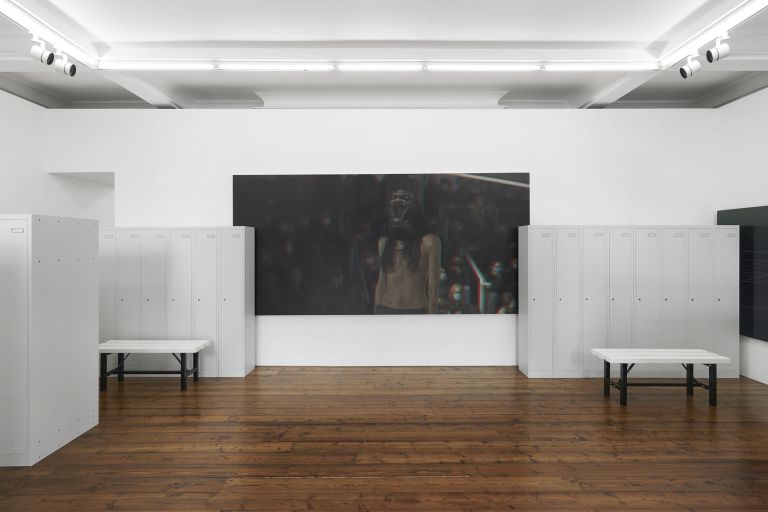
Continuing and expanding upon the narrative arc of Anne Imhof’s recent exhibitions, the works in Avatar II interweave notions of reality and artifice, presence and absence, exposure and concealment.
In the first show to span all four of the London gallery's floors, the works range from oil paintings, large-scale paintings on aluminum panels, and drawings to film and sound works. Fitness equipment and gym furniture are installed throughout the gallery, blurring the boundaries between functional object and art while creating a multilayered experience as visitors encounter and move through Imhof's abundant spaces.



Anne Imhof
Pacific, 2022
Acrylic on aluminum
200 × 400 cm
78 3/4 × 157 1/2 inches
Anne Imhof
Pacific, 2022 (detail)
Anne Imhof
Pacific, 2022
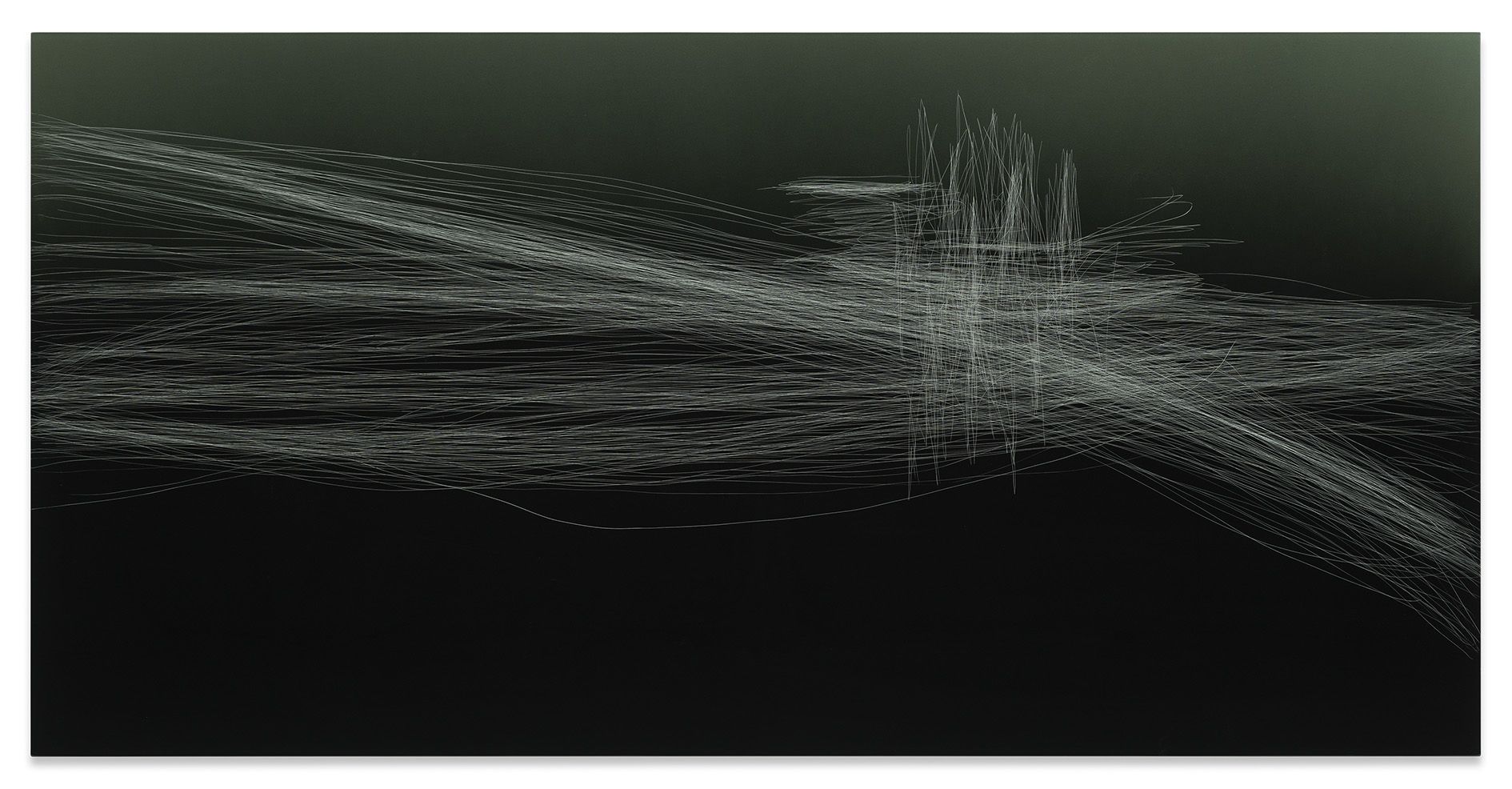
Anne Imhof
Pacific, 2022
Acrylic on aluminum
200 × 400 cm
78 3/4 × 157 1/2 inches
Anne Imhof
Pacific, 2022
Acrylic on aluminum
200 × 400 cm
78 3/4 × 157 1/2 inches


Anne Imhof
Pacific, 2022 (detail)
Anne Imhof
Pacific, 2022 (detail)
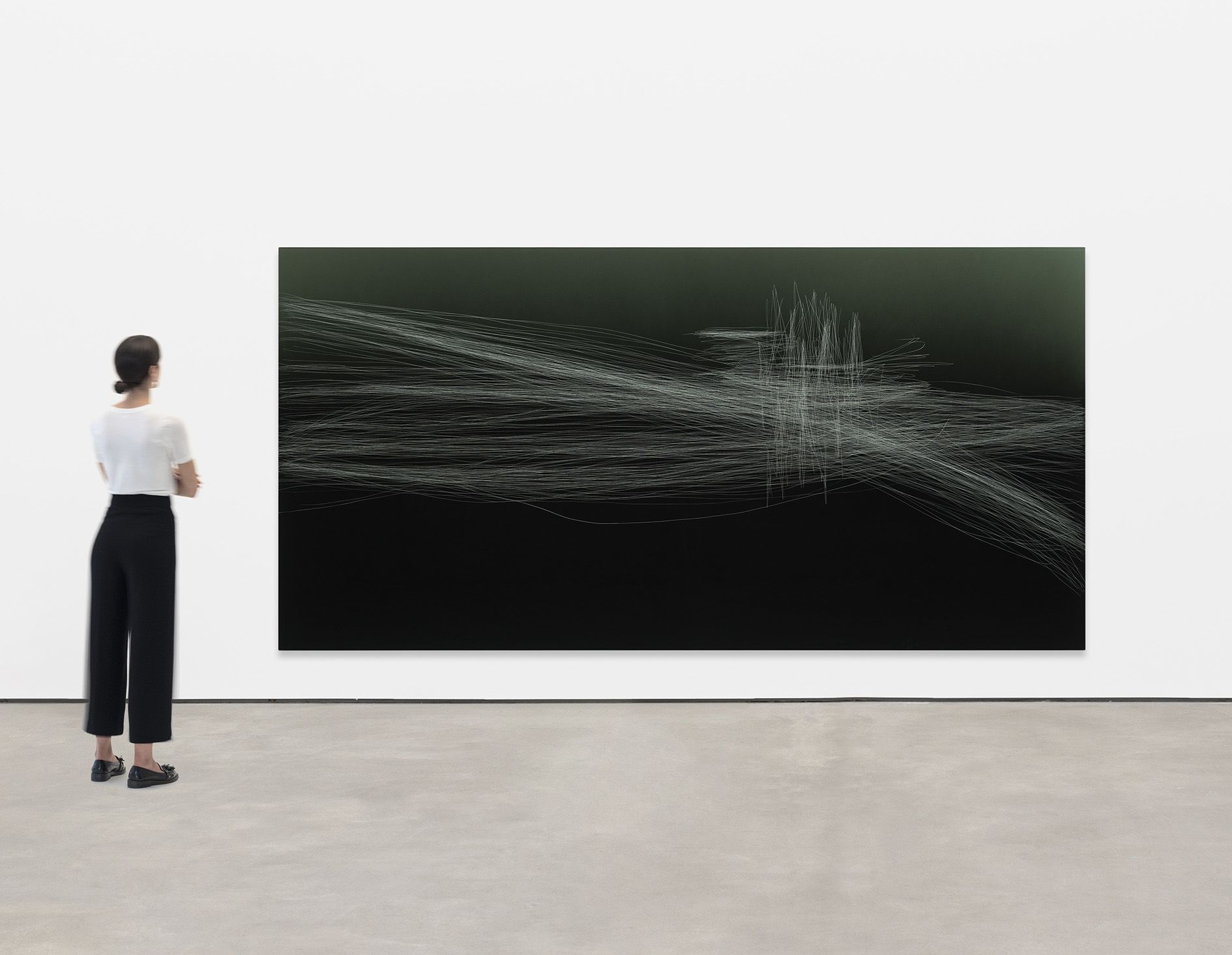

Anne Imhof
Pacific, 2022
Anne Imhof
Pacific, 2022
Imhof's spatial orchestrations are evident from the outset: as visitors approach the exhibition from street level, their line of sight into the gallery's glass storefront is delimited, boxed in by rows of lockers and blocked in part by the back of one of Imhof’s aluminum panel works suspended unexpectedly from the ceiling. Just below this hanging panel, at the back of the room, one catches a glimpse of a painting depicting Imhof's collaborator Eliza Douglas.
Anne Imhof
Jester, 2022
Oil on canvas
180 × 390 cm
70 7/8 × 153 1/2 inches
Anne Imhof
Jester, 2022 (detail)
Anne Imhof
Jester, 2022

Anne Imhof
Jester, 2022
Oil on canvas
180 × 390 cm
70 7/8 × 153 1/2 inches
Anne Imhof
Jester, 2022
Oil on canvas
180 × 390 cm
70 7/8 × 153 1/2 inches


Anne Imhof
Jester, 2022 (detail)
Anne Imhof
Jester, 2022 (detail)


Anne Imhof
Jester, 2022
Anne Imhof
Jester, 2022
The image is captured from a performance last year as part of Imhof's celebrated exhibition Natures Mortes at the Palais de Tokyo in Paris. Walking deliberately, her torso nude, she has obscured her face with a sinister clown T-shirt pulled over her head, taking on the guise of a jester. A rare figurative painting in Imhof's oeuvre, this work sets a tone of beauty, imagined dystopia and foreboding that frequently accompanies the artist's work.
Anne Imhof
Pacific, end of truth I, 2022
Acrylic on aluminum
150 × 200 cm
59 × 78 3/4 inches
Anne Imhof
Pacific, end of truth I, 2022

Anne Imhof
Pacific, end of truth I, 2022
Acrylic on aluminum
150 × 200 cm
59 × 78 3/4 inches
Anne Imhof
Pacific, end of truth I, 2022
Acrylic on aluminum
150 × 200 cm
59 × 78 3/4 inches
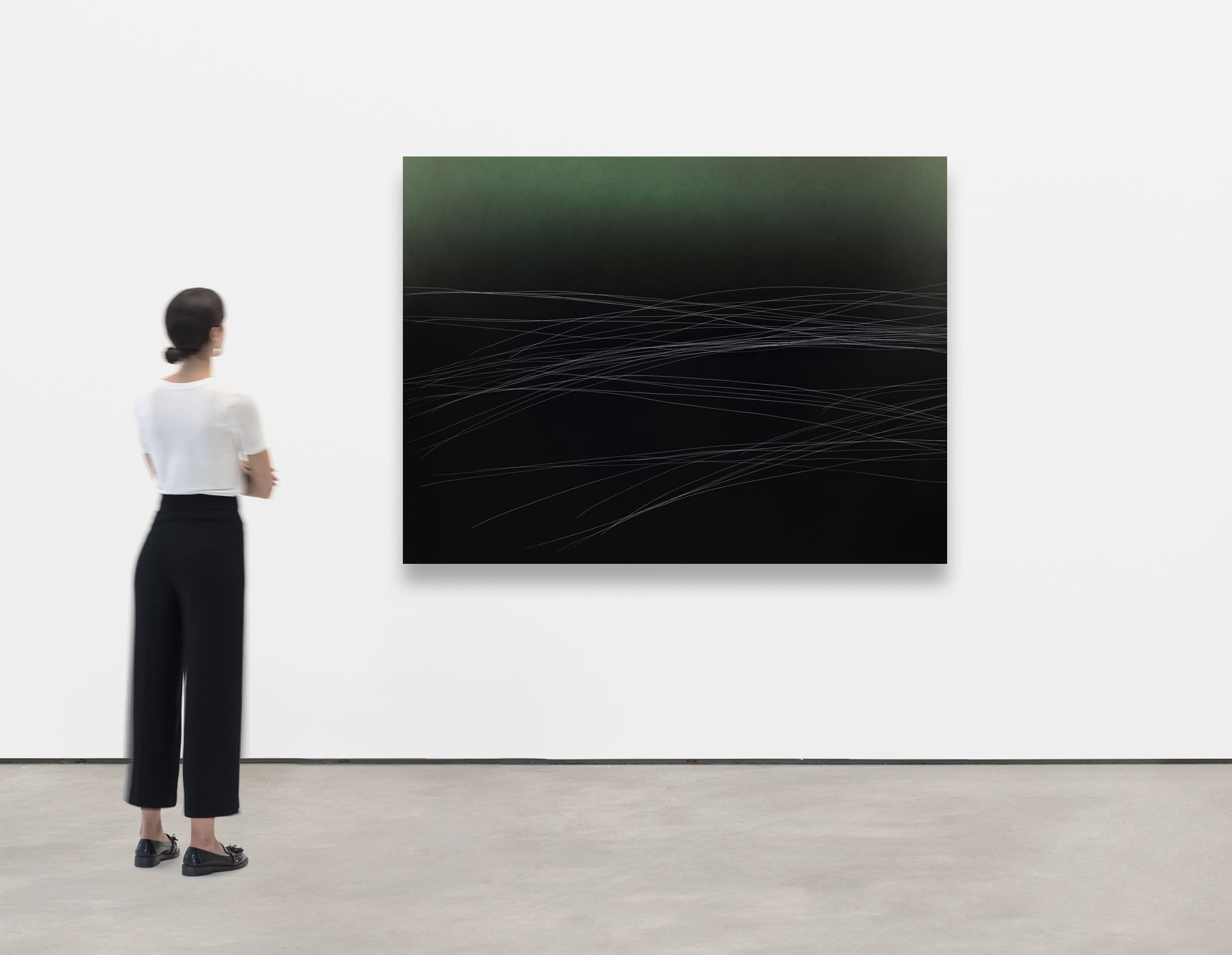

Anne Imhof
Pacific, end of truth I, 2022
Anne Imhof
Pacific, end of truth I, 2022
Anne Imhof
Pacific, end of truth VIII, 2022
Acrylic on aluminum
150 × 200 cm
59 × 78 3/4 inches
Anne Imhof
Pacific, end of truth VIII, 2022 (detail)
Anne Imhof
Pacific, end of truth VIII, 2022 (detail)
Anne Imhof
Pacific, end of truth VIII, 2022

Anne Imhof
Pacific, end of truth VIII, 2022
Acrylic on aluminum
150 × 200 cm
59 × 78 3/4 inches
Anne Imhof
Pacific, end of truth VIII, 2022
Acrylic on aluminum
150 × 200 cm
59 × 78 3/4 inches


Anne Imhof
Pacific, end of truth VIII, 2022 (detail)
Anne Imhof
Pacific, end of truth VIII, 2022 (detail)


Anne Imhof
Pacific, end of truth VIII, 2022 (detail)
Anne Imhof
Pacific, end of truth VIII, 2022 (detail)


Anne Imhof
Pacific, end of truth VIII, 2022
Anne Imhof
Pacific, end of truth VIII, 2022
Imhof’s experimental, restrained approach to installation unfolds further in the subsequent galleries by creating a labyrinthine network with monochromatic banks of gym lockers.
On the one hand these structures create rooms and passageways for the spectator, with benches that encourage rest and contemplation; on the other, they bar entry and connote the secreting of objects and information, while also suggesting the presence bodies and physical exertion
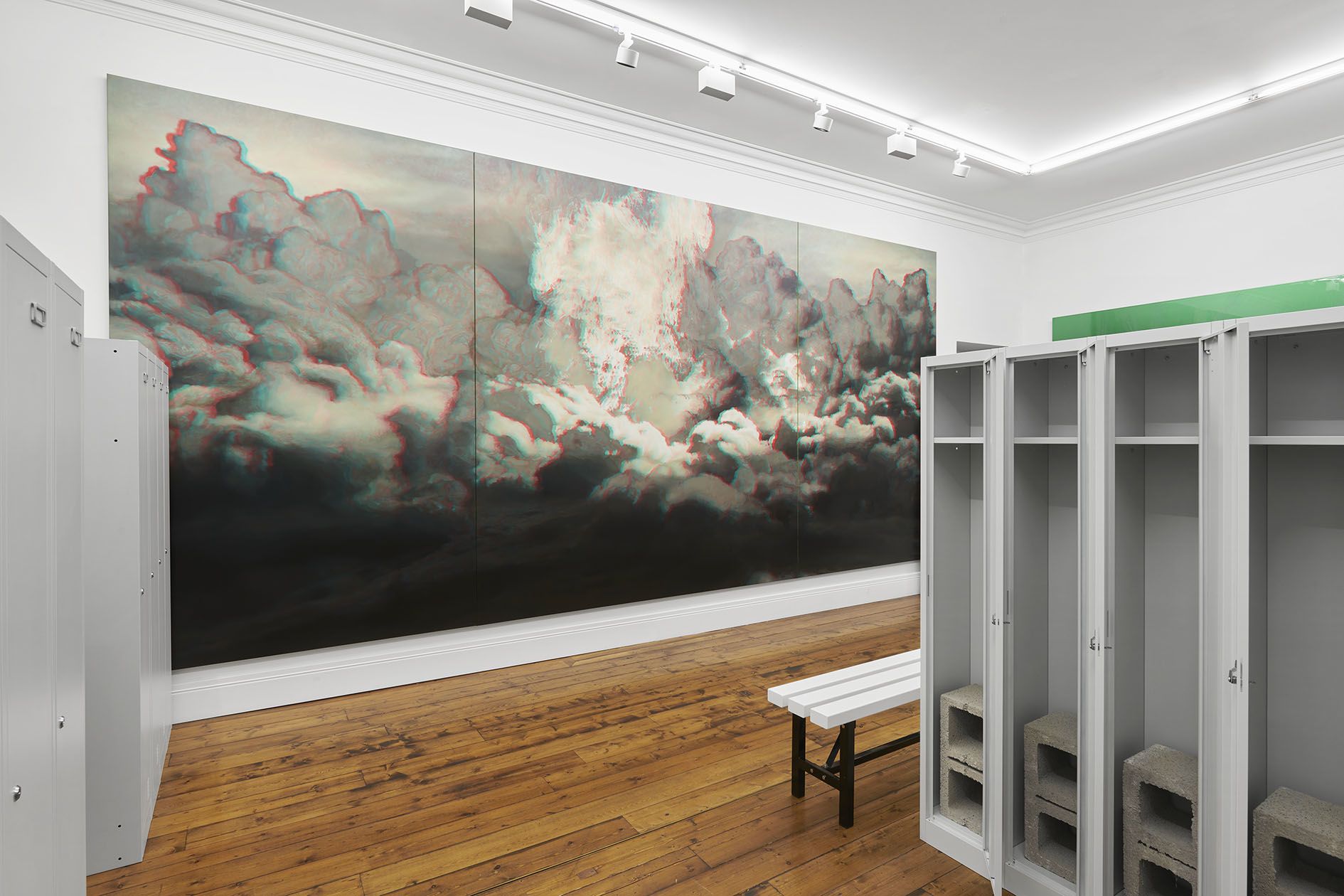
Another monumental, multi-panel canvas occupies an adjacent room depicting an explosion, and like the portrait of Douglas, it features a three-dimensional effect new to Imhof's painting practice. Though at first the image appears realistically rendered in grayscale, a closer look reveals fields of pale red and greens, as well as the flattened 3D effect—imagery all painted by hand, but generated digitally.
Anne Imhof
Cloud II, 2022
Oil on canvas
289.5 × 608.8 cm
114 × 239 3/4 inches
Anne Imhof
Cloud II, 2022 (detail)
Anne Imhof
Cloud II, 2022 (detail)
Anne Imhof
Cloud II, 2022 (detail)
Anne Imhof
Cloud II, 2022
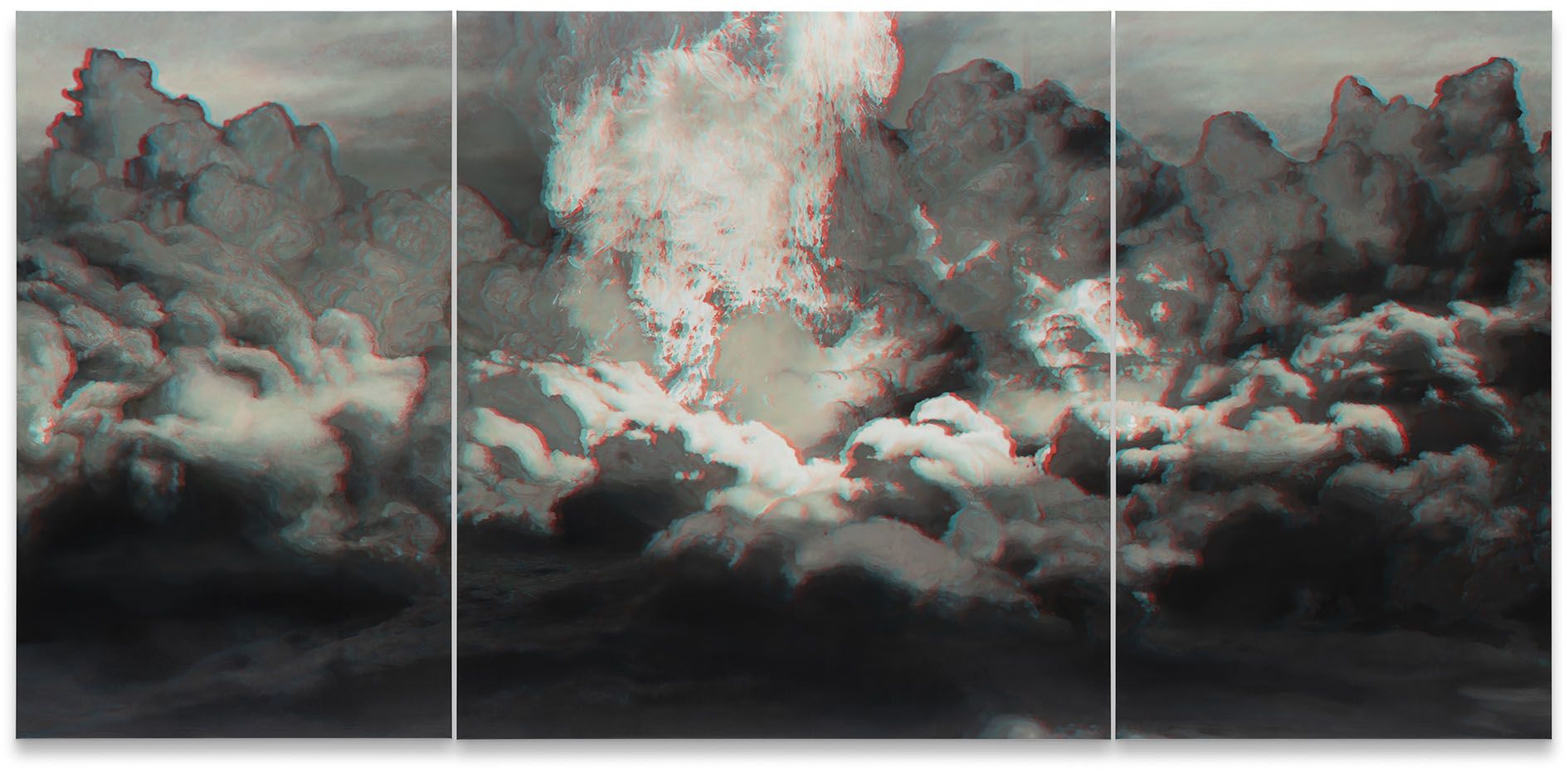
Anne Imhof
Cloud II, 2022
Oil on canvas
289.5 × 608.8 cm
114 × 239 3/4 inches
Anne Imhof
Cloud II, 2022
Oil on canvas
289.5 × 608.8 cm
114 × 239 3/4 inches
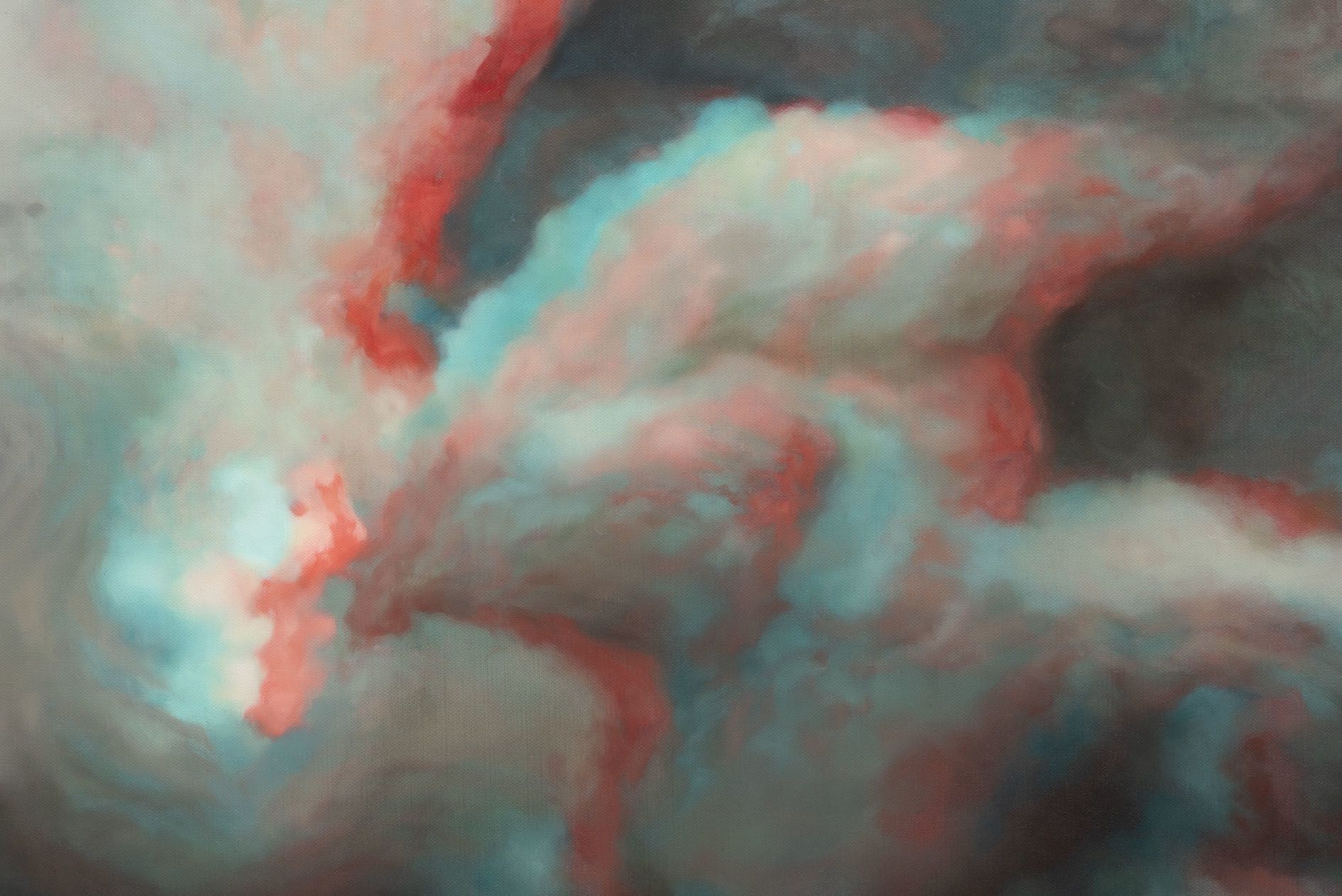

Anne Imhof
Cloud II, 2022 (detail)
Anne Imhof
Cloud II, 2022 (detail)
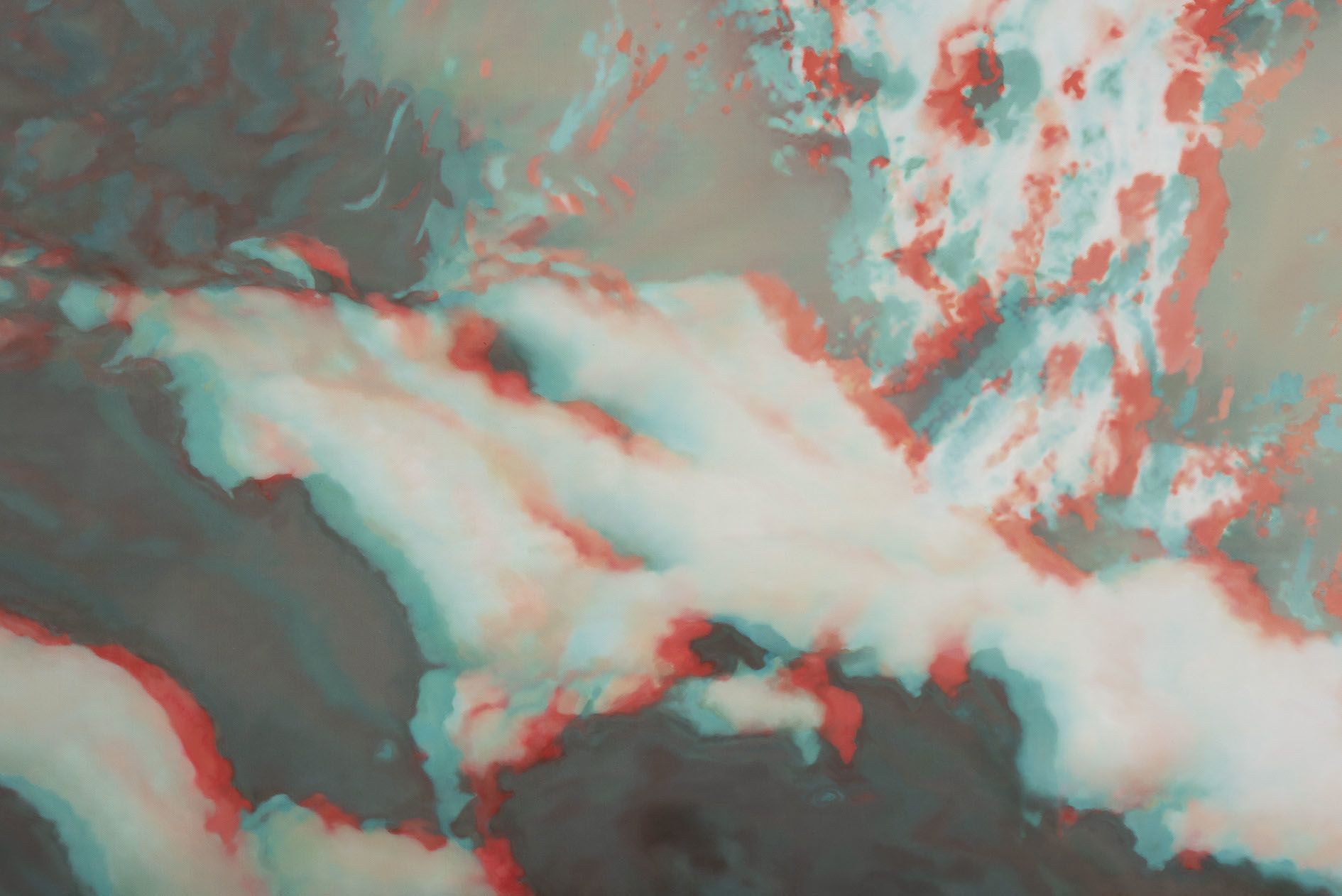

Anne Imhof
Cloud II, 2022 (detail)
Anne Imhof
Cloud II, 2022 (detail)


Anne Imhof
Cloud II, 2022 (detail)
Anne Imhof
Cloud II, 2022 (detail)


Anne Imhof
Cloud II, 2022
Anne Imhof
Cloud II, 2022
Anne Imhof
Monster III, 2022
Acrylic on aluminum
200 × 270 cm
106 1/4 × 78 3/4 inches
Anne Imhof
Monster III, 2022 (detail)
Anne Imhof
Monster III, 2022 (detail)
Anne Imhof
Monster III, 2022
With their tones of cool blue-greens, the paintings likewise guide viewers along Imhof's immersive path, in which a productive confusion arises between art, objects and architectural elements.

Anne Imhof
Monster III, 2022
Acrylic on aluminum
200 × 270 cm
106 1/4 × 78 3/4 inches
Anne Imhof
Monster III, 2022
Acrylic on aluminum
200 × 270 cm
106 1/4 × 78 3/4 inches


Anne Imhof
Monster III, 2022 (detail)
Anne Imhof
Monster III, 2022 (detail)
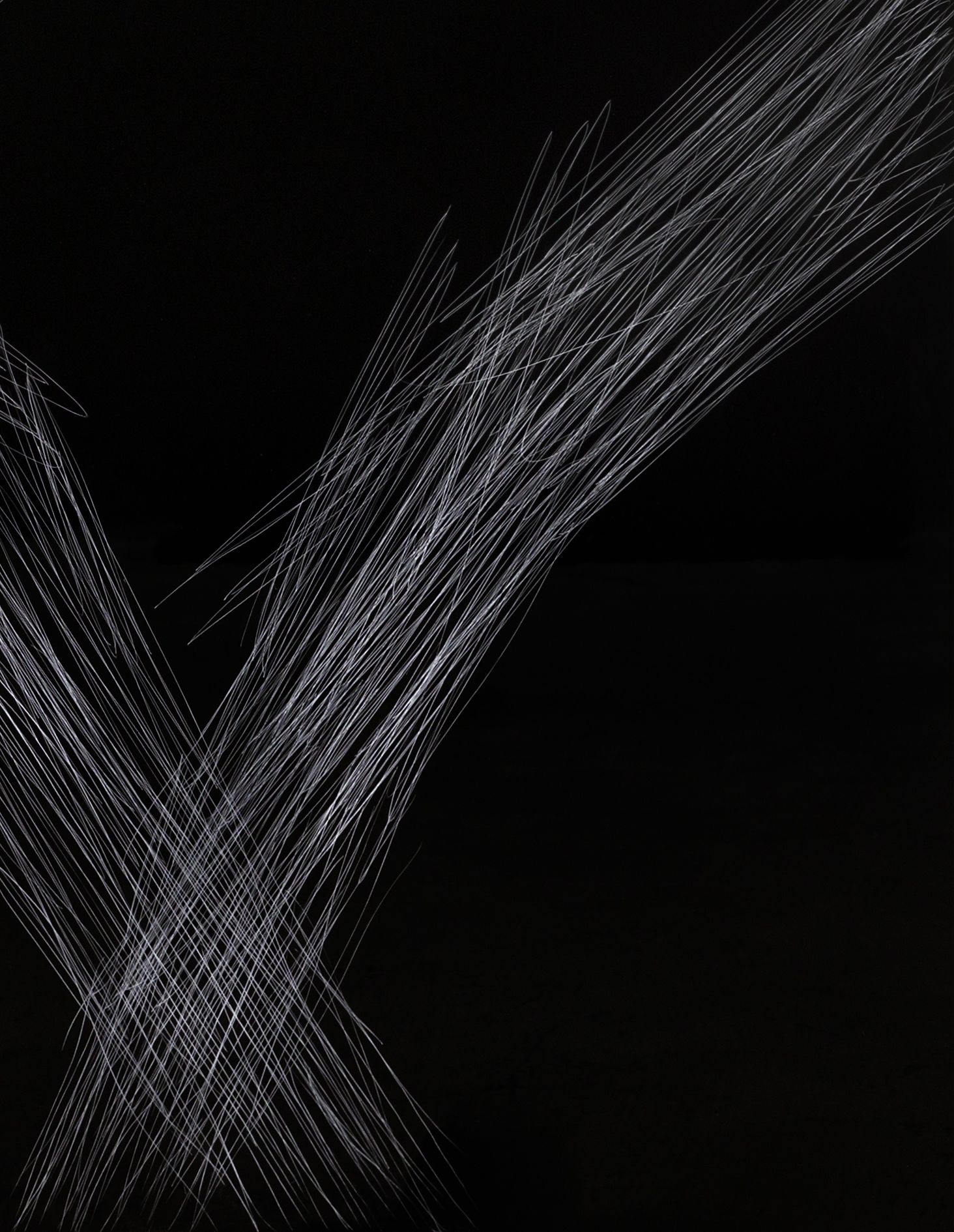

Anne Imhof
Monster III, 2022 (detail)
Anne Imhof
Monster III, 2022 (detail)
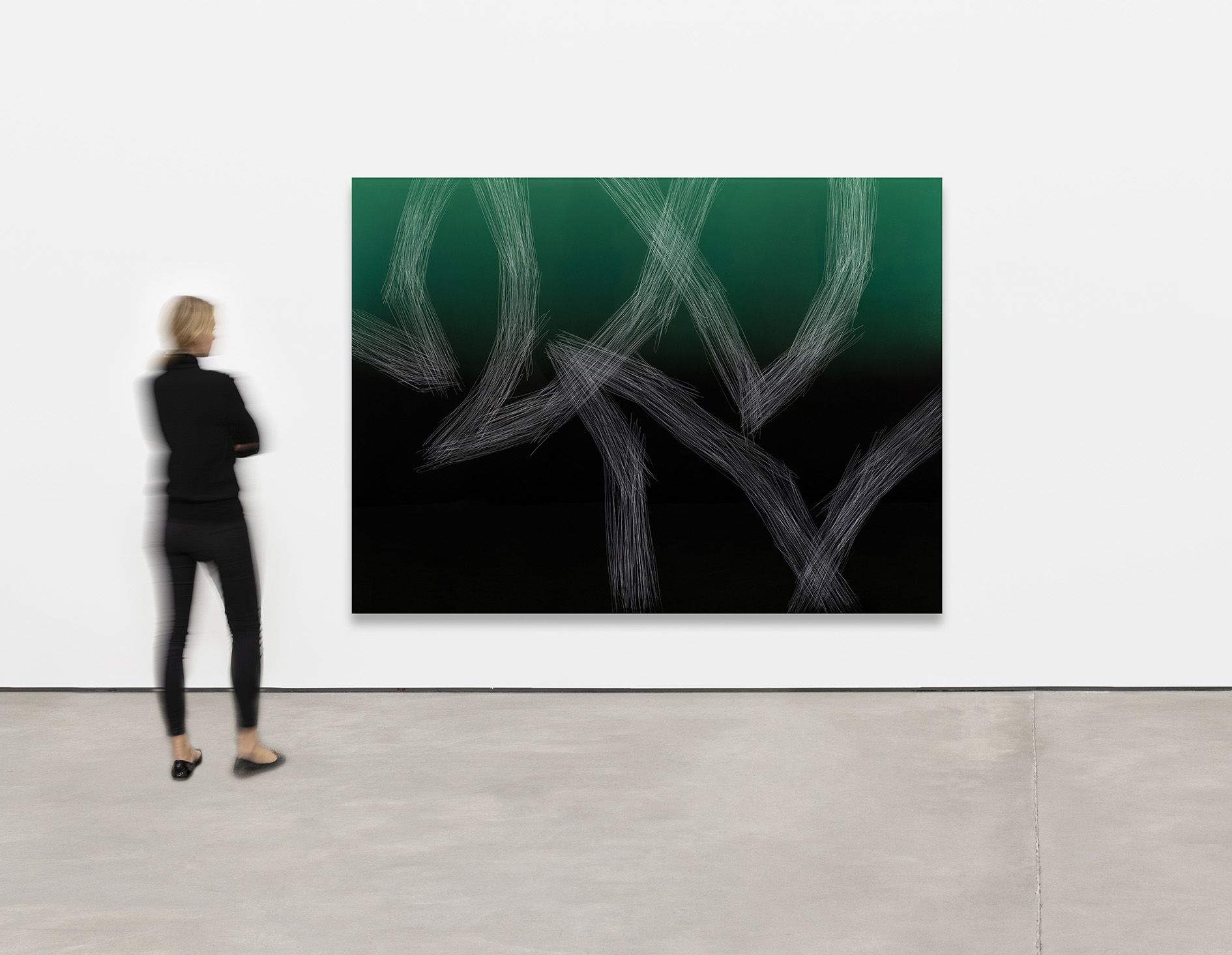

Anne Imhof
Monster III, 2022
Anne Imhof
Monster III, 2022
With their tones of cool blue-greens, the paintings likewise guide viewers along Imhof's immersive path, in which a productive confusion arises between art, objects and architectural elements.

The physical, "real" presence of the lockers and benches is rendered surreal and abstract in a new film debuting within the exhibition. Douglas appears again, this time occupying an amorphous space as she sits and stands surrounded by one of the locker-room benches and a row of lockers. The film's backdrop shifts between abstracted fields of color and light. Though bodies are mostly absent in Imhof's artworks—which often imply potential sites for performances—in this case the human body is fully present and the background is what becomes nebulous and intangible. This aspect of the film also serves as a metaphor for Imhof's approach more broadly: to deploy specific, precise objects and imagery that nevertheless project a universal, expansive realm for imagination.
Anne Imhof
Avatar, 2022
Video, color, sound
32:21 min
Anne Imhof
Avatar, 2022 (video still)
Anne Imhof
Avatar, 2022 (video still)
Anne Imhof
Avatar, 2022
Video, color, sound
32:21 min
Anne Imhof
Avatar, 2022
Video, color, sound
32:21 min
Anne Imhof
Avatar, 2022 (video still)
Anne Imhof
Avatar, 2022 (video still)
Anne Imhof
Avatar, 2022 (video still)
Anne Imhof
Avatar, 2022 (video still)
Anne Imhof
Not yet titled, 2022
Pencil on paper
26 × 18 cm
10 1/4 × 7 inches
Anne Imhof
Not yet titled, 2022
Pencil on paper
31 × 41 cm
12 1/8 × 16 1/8 inches
Anne Imhof
Not yet titled, 2022
Pencil on paper
29.5 × 41.5 cm
11 5/8 × 16 3/8 inches
Further revealing Imhof's sensitive use of space and the human form are a selection of drawings, in which spare, purposeful lines delineate attenuated bodies in motion. Artworks in their own right, the drawings can also be understood as preparatory gestures for future performances, which, like her objects and installations, Imhof carefully plans in tune with the spaces they occupy.
In this exhibition, as in the artist's work as a whole, Imhof masters space and builds expectations for the viewer, only to twist and sabotage any clear-cut interpretations of her immersive, unnerving and powerful environments.
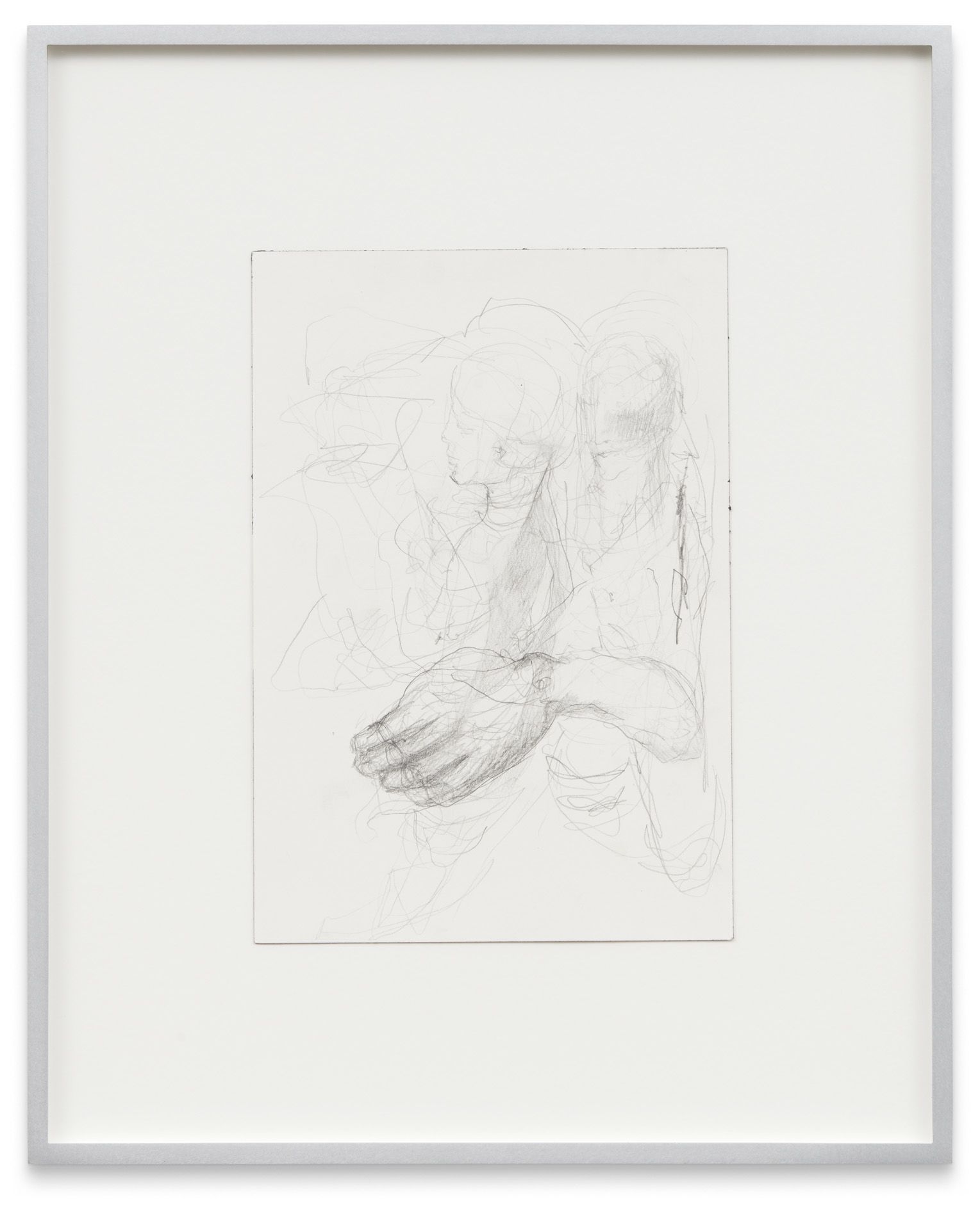
Anne Imhof
Not yet titled, 2022
Pencil on paper
26 × 18 cm
10 1/4 × 7 inches
Anne Imhof
Not yet titled, 2022
Pencil on paper
26 × 18 cm
10 1/4 × 7 inches

Anne Imhof
Not yet titled, 2022
Pencil on paper
31 × 41 cm
12 1/8 × 16 1/8 inches
Anne Imhof
Not yet titled, 2022
Pencil on paper
31 × 41 cm
12 1/8 × 16 1/8 inches

Anne Imhof
Not yet titled, 2022
Pencil on paper
29.5 × 41.5 cm
11 5/8 × 16 3/8 inches
Anne Imhof
Not yet titled, 2022
Pencil on paper
29.5 × 41.5 cm
11 5/8 × 16 3/8 inches
Further revealing Imhof's sensitive use of space and the human form are a selection of drawings, in which spare, purposeful lines delineate attenuated bodies in motion. Artworks in their own right, the drawings can also be understood as preparatory gestures for future performances, which, like her objects and installations, Imhof carefully plans in tune with the spaces they occupy.
In this exhibition, as in the artist's work as a whole, Imhof masters space and builds expectations for the viewer, only to twist and sabotage any clear-cut interpretations of her immersive, unnerving and powerful environments.
Anne Imhof
Not yet titled, 2022
Pencil on paper
31 × 41 cm
12 1/8 × 16 1/8 inches
Anne Imhof
Not yet titled, 2022
Pencil on paper
29.5 × 41.5 cm
11 5/8 × 16 3/8 inches

Anne Imhof
Not yet titled, 2022
Pencil on paper
31 × 41 cm
12 1/8 × 16 1/8 inches
Anne Imhof
Not yet titled, 2022
Pencil on paper
31 × 41 cm
12 1/8 × 16 1/8 inches
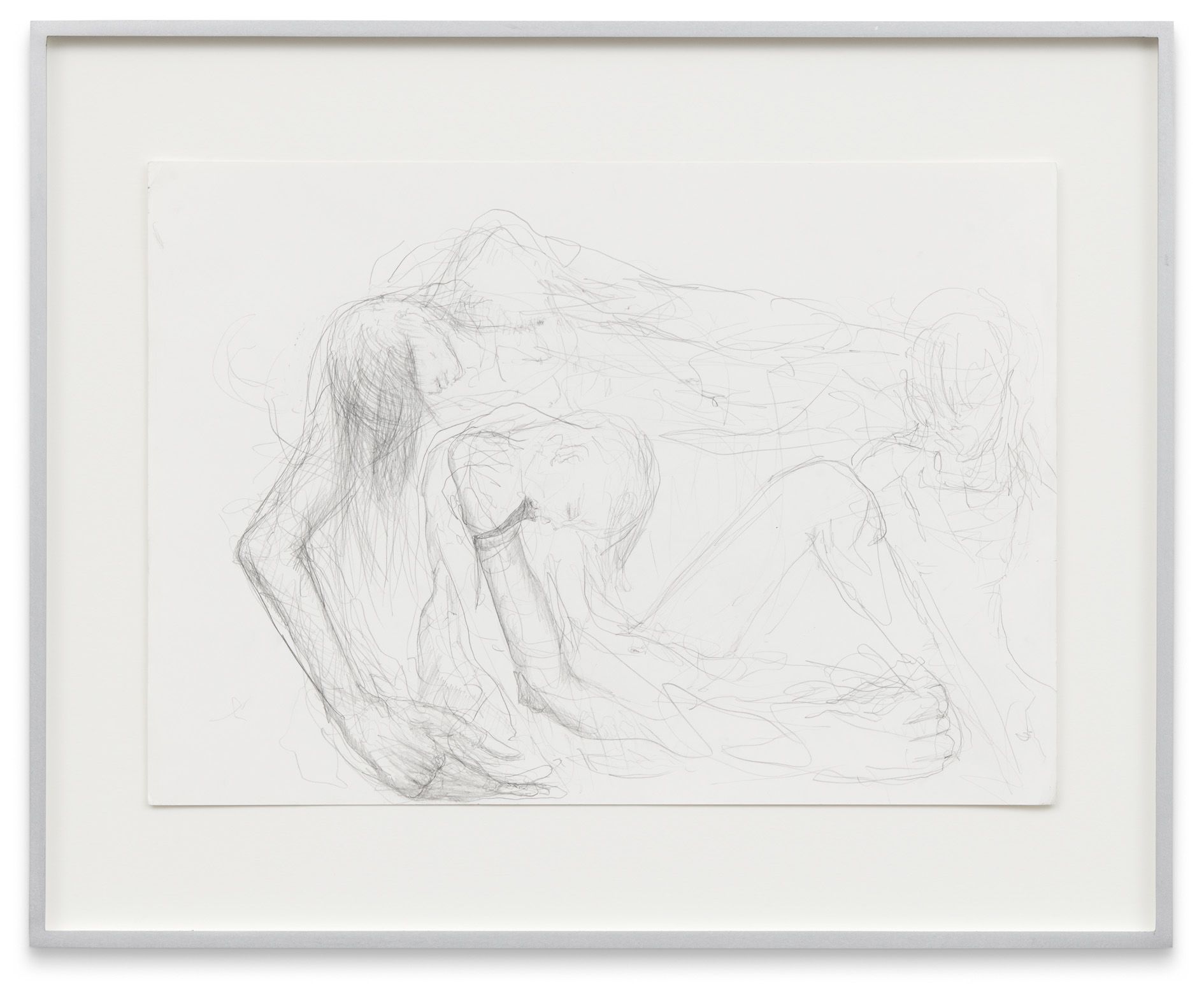
Anne Imhof
Not yet titled, 2022
Pencil on paper
29.5 × 41.5 cm
11 5/8 × 16 3/8 inches
Anne Imhof
Not yet titled, 2022
Pencil on paper
29.5 × 41.5 cm
11 5/8 × 16 3/8 inches
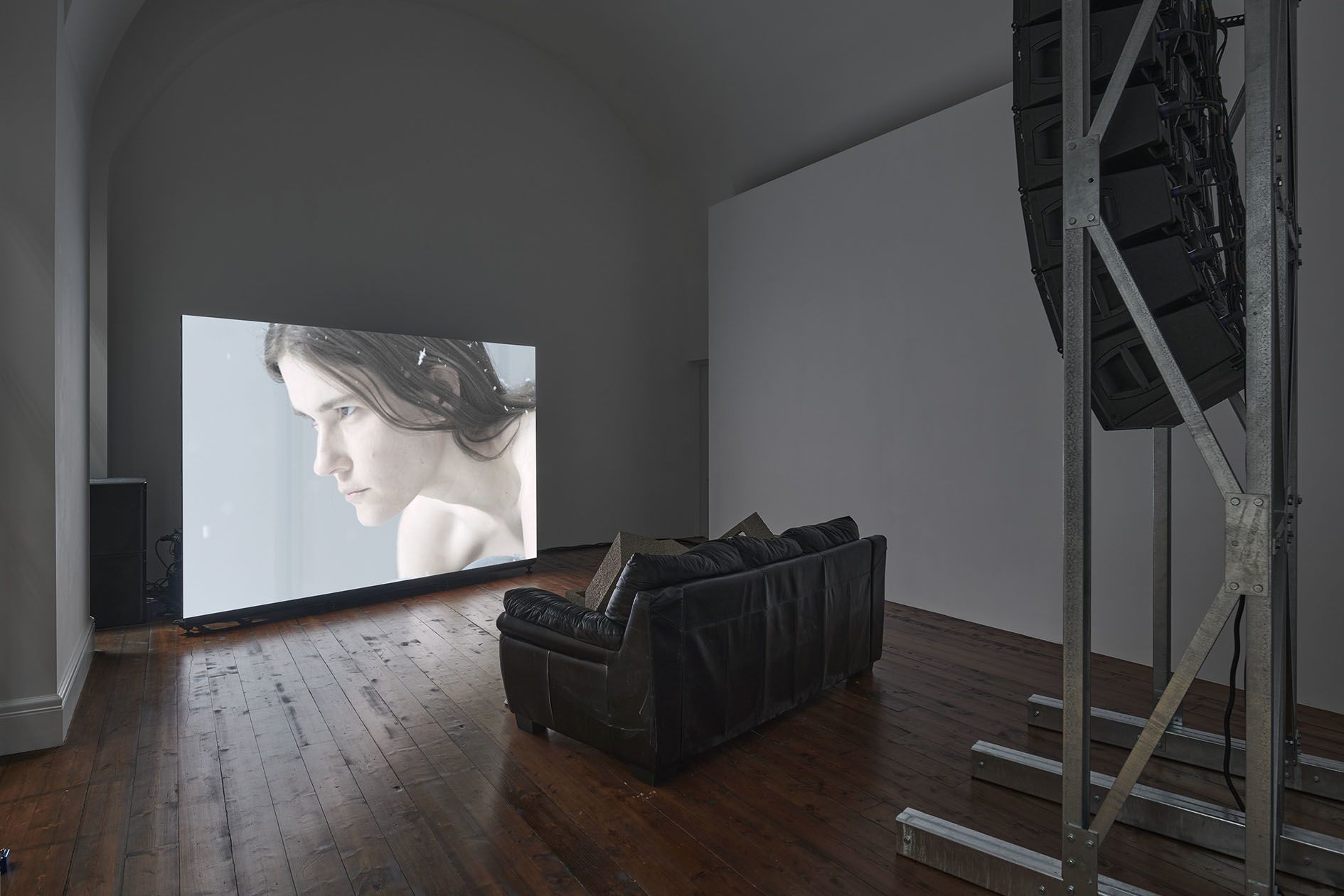
All installation views: Ben Westoby
Anne Imhof
Avatar II
September 23–December 23, 2022
This site uses cookies to improve user experience. By clicking “Accept” you consent to our use of cookies. Further information can be found in our Cookie Policy.
To provide the best experiences, we use technologies like cookies to store and/or access device information. Consenting to these technologies will allow us to process data such as browsing behavior or unique IDs on this site. Not consenting or withdrawing consent, may adversely affect certain features and functions.
To receive all news concerning our exhibitions and events, please subscribe to our newsletter. After a long tradition of mailing poster announcements, Sprüth Magers will send this information exclusively via email going forward in order to limit our carbon footprint. Posters will still be available at our physical locations and can be sent out by mail upon request.
Our newsletter will keep you up to date with the full range of the gallery’s activities and our artists’ exhibitions, at the gallery and in museums. We send a newsletter three or four times a month.
If you sign up to receive our newsletter, we will save your email address, full name, and any other information you provide in order to send you more personalized content. We may track how often the newsletters are opened, and whether the links within them have been opened. You can revoke your consent by unsubscribing from the newsletter at any time.
